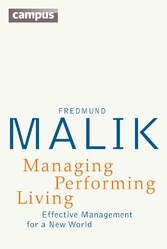
Managing Performing Living - Effective Management for a New World
von: Fredmund Malik
Campus Verlag, 2015
ISBN: 9783593429946
Sprache: Deutsch
405 Seiten, Download: 5221 KB
Format: EPUB, PDF, auch als Online-Lesen
Chapter 1
THE IDEAL MANAGER—A WRONG QUESTION
One of the questions most frequently asked is: What should an ideal manager be like? What characteristics should he or she have?
There is hardly a discussion on management where this question does not pop up. It goes back to a conscious or subconscious notion: that of the ideal manager. As soon as they hear the word “management,” most people reflexively wonder: What is the ideal manager like? This question also dominates the literature on management, and most of the training programs offered for executives. Still, it is a question that is simply wrong.
The Universal Genius—A Stumbling Block
After more than 40 years of empirical research in this field, it is easy to answer this question today. Everything that could be researched in this field has been researched. As a result, we know the profile of an ideal manager in great detail.
Let me give you some examples: In a study, 600 of the largest companies in Germany were questioned on the management qualities they look for. The result was striking: entrepreneurial, a team-builder, communicative, visionary, international perspective, ecological and social focus, integrity, charisma, multicultural skills, and intuitive decision-making. Well, there’s not much we could find objectionable here.
In the bulletin of a large Swiss bank that operates globally, there was an article by one of its top managers on the “Twelve I’s of the Ideal Profile.” It told us that, apart from possessing other qualities, the manager of the future must be interrogative-integral, and an integrating intermediary as well as intercommunicative-instructive … Perhaps not quite the qualities we learn at school.
In a recent issue of the most widely distributed management magazine in the German speaking world, a piece called “The ABC of New Requirements” was published which listed a total of 45 “key qualities for the future manager.” These were divided into “personal qualities, management qualities and organizational factors”—a compendium of desirable skills. To make it seem more practical the piece was presented in the form of a test which could be taken and evaluated immediately. The fact that certain terms in the test—such as “communicative competence,” “empathy,” “future-mindedness” and “system integration”—are open to widely differing interpretations was casually overlooked. If you achieved a score between 1.0 and 2.5, you were told that presumably “you meet all the requirements in the new profile of a business virtuoso” …
Examples like these abound. They are typical and representative of a universal way of thinking that has gained ground not only in business but also in other social spheres. Peculiar requirements like these appear in most job advertisements, and a major share of management tools used in practice build on things such as performance assessment systems, potential analyses, recruitment and selection processes, remuneration systems, and many more.
I, too, learnt all of these things in university, and for the reasons given above I accepted them—almost. Why “almost”? Because I was lucky enough to have worked with colleagues and staff even before my university study, owing to my prior occupation. I had also collected experiences with bosses, good and bad ones. These were real people, as opposed to academic fictions. I knew how things worked in a company. That kept me from believing anything just because it was taught at the university—and often by faculty with little or no practical experience. Plausibility, or the fact that it is taught in universities or is the prevalent opinion, is no guarantee of the correctness of a concept. What type of idea is spread by these lists and catalogues of requirements? What is the basic type of manager that emerges here? It is the image of a universal genius. In some strange way, the idea has taken root that a manager, especially a top manager, should be a cross between a general from a bygone era, a Nobel Prize winner for physics, and a TV show host. Although this ideal type can be described and descriptions indeed abound, we cannot find such people in the real world. This basic error represents one of the main obstacles to a reasonable theory and practice of management.
These comments also entail some degree of criticism directed at academia. In essence, academia is doing what it is expected to do. It answers the questions about the characteristics and skills of the ideal manager. And its answers are correct and scientifically sound: Yes, the ideal manager could well be as he or she is presented in the studies. It is not the answers that are wrong—it is the question.
However, it is one of the duties of science to replace wrong questions with the right ones.
The Effective Person
I suggest giving up the question of the ideal manager altogether, as it has no practical relevance. Even if we assume—for now, and for the sake of argument—that there is such a thing as universal geniuses, statistically their numbers would not suffice to fill the many management positions we have.
I therefore suggest asking another question. Instead of: Who is an ideal manager?, we should ask: What makes an effective manager? This question is radically different from the first. Its starting point is not the genius, but the ordinary person—because there simply are not enough of the former.
So, with this different question, the fundamental problem of management is not: How can geniuses deliver ingenious results? Rather, the fundamental problem in the organized society is: How can we enable ordinary people—since we have plenty of those —to deliver extraordinary results? What I am referring to here, however, is not the much-cited quality of excellence. No one, not even the top manager, can consistently deliver peak performance. It is unrealistic to keep demanding excellence. It is also inhuman. Neither, however, is standard performance adequate any longer in today’s complexity society. We need more than that. This is a paradox of management nowadays, and one of the reasons we need management at all. What is available—at least in sufficient numbers—is ordinary people; but what competition worldwide calls for is extraordinary performance.
What are the people like who deliver outstanding performance over long periods of time, sometimes even for all their lives? In other words, what kind of people make effective managers? The fact of the matter is the following: There are such people, but whenever we compare them having this question in mind, we will quickly realize that there is not a single model or personality. These people are totally different from each other.
No Accordance in Personalities
Against this background, decades ago I started studying people who have delivered exceptional performance in the course of their lives—people we could call performers. So what do these people have in common?
Effective individuals are as different as human beings can be. What everyone is always looking for—commonalities—do not exist. What does exist, on the other hand, is the individuality of human beings—the very characteristics that make them different.
No two persons are alike. This is all the more true the higher the positions people hold. A person does not ascend to the higher positions and even the top of an organization by virtue of the fact that he or she is an indistinguishable copy of another person, a genetic clone almost. Their rise is more due to the fact that they are different from the rest.
In my long practice, I have met top managers who were highly intelligent—brilliant minds who had not one but two or even three university degrees, which may have helped them to climb the career ladder. Others were equipped with a rather standard intellect, but were just as successful in their jobs. Some managers conform to the required ideal image of a communicator: they are extroverts and find it easy to make new contacts, an ability that has probably made life easier for them in many situations. Many more managers, however, are rather introverted, some even downright shy, but are still just as good at their jobs. Some have the charisma so often demanded: they are what people call a great personality, and their presence is physically felt the moment they enter a room—which may have helped their success. Others have none of that: they are rather nondescript physically, never catching anyone’s attention, apart from those in their immediate organizational vicinity—but their achievements are just as impressive.
What Counts Is What You Do, Not What You Are Like
I could carry on like that for a long time. The essence of it all is this: Effective people share no common features apart from the fact that they are effective. And the “secret” to their effectiveness does not lie in the answer to the question: What should people be like in order to be eligible for a management position? It is not the personality or character, education or social origin—important as these factors may be in the individual case. Neither does the key to their effectiveness lie in their virtues, as is so often supposed. Desirable as these are, and as little as I would advise against being virtuous, I would, by the same measure, not invest all my faith in virtue when it comes to discussing management qualities. It is not what matters most for a manager’s effectiveness.
The key to effectiveness is not how people...










